#dung fly
Explore tagged Tumblr posts
Text

Golden Dung Fly
A fluffy golden dung fly sitting on a plant leaf, at RSPB Fowlmere.
#cambridgeshire#canon#canonuk#dung fly#fauna#flies#fly#fowlmere#golden dung fly#insect#insects#invertebrate#invertebrates#minibeast#minibeasts#nature#nature reserve#outdoors#rspb#rspb fowlmere#scathophaga stercoraria#wildlife
7 notes
·
View notes
Note
Tim should be able to shift into a moose
For any particular reason or did you just decide tim deserves to be a good bit taller?
169 notes
·
View notes
Photo

Anonymous submitted: Do you know what this tiny guy hanging around the bees is? I live in Ireland if that helps
Yep, looks like a golden dung fly! Very common and very fuzzy and cute. Interestingly, adults are predatory and eat mainly other flies! Larvae feed on dung, as the name implies :)
139 notes
·
View notes
Text
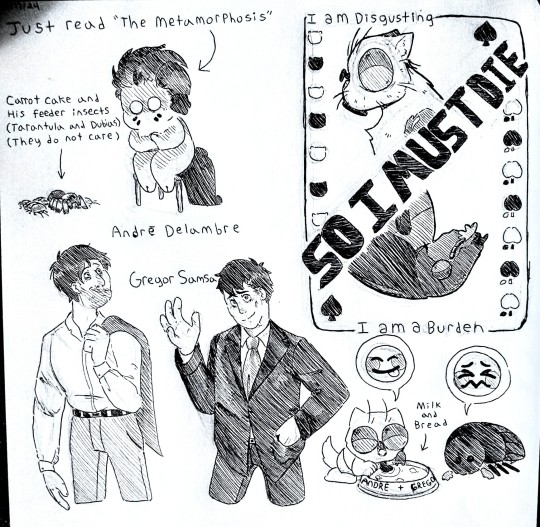
I think men should just be allowed to turn into giant bugs sometimes.
#The Fly 1958#Kafka's Metamorphosis#Franz Kafka#George Langelaan#Langelaan's The Fly#Animals#Invertebrates#Arthropods#Arachnids#Insects#Tarantulas#Cockroaches#Flies#Beetles#Red Legged Tarantula#Dubia Roach#Dung Beetle#Suicidal Ideation TW#The metaphor of George looking toward a hospital but unable to receive help just hit me aaaa#Carrot Cake the Tarantula
10 notes
·
View notes
Text
#2198 - Oxysarcodexia varia - Striped Dung Fly


A Flesh Fly that despite the name and the habits of its Sarcophagid relatives, breeds in compost and dung. It probably originated in South America but is now found over much of Oceania, most often in open areas like farms.
A known vector of rabbit haemorrhagic disease virus and the tapeworms Taenia ovis and T. hydatigena, which infest dogs and sheep
Athenree Gorge, Aotearoa
2 notes
·
View notes
Text
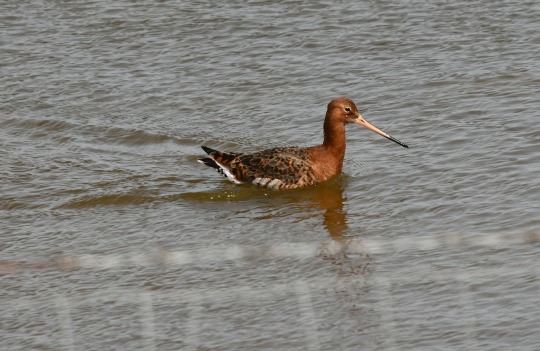
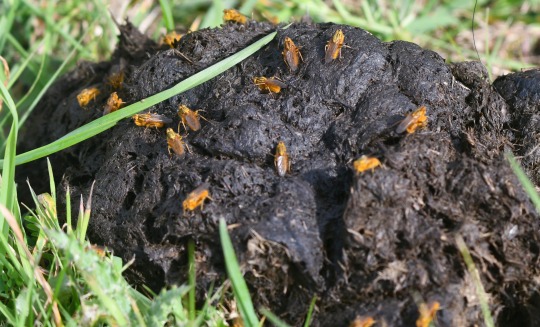
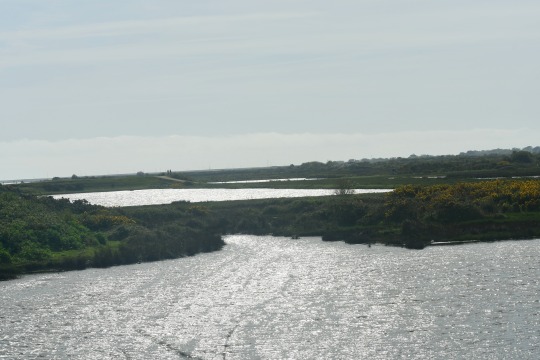

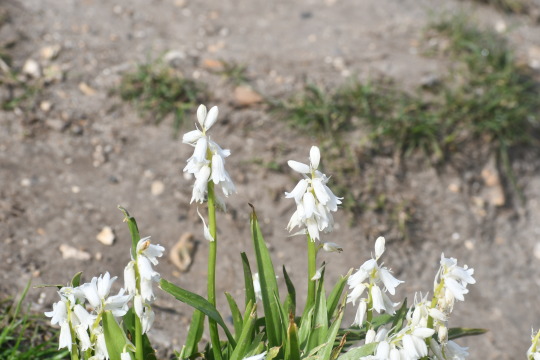

13/04/2024-A fine summer plumage Black-tailed Godwit, yellow dung flies, bluebells, Eider and views on a brilliant afternoon at Lymington and Pennington today.
My first bright Wheatear and Whitethroat of the year and also my much anticipated first Swallows of the year floating through the breezy air taking my year list to 154 were other highlights today. Also good to see today were many Sand Martins, Skylark, Buzzard, Reed Bunting, Greenfinch, Shelduck, Pochard, Mediterranean Gulls, so many Avocets which it was a phenomenal experience to see, Lapwings, Redshank, Peacock butterfly, my first clover and plantain of the year, lesser celandine, buttercup, greater stitchwort, cow parsley and red deadnettle.
#black-tailed godwit#yellow dung fly#bluebells#eider#lymington#pennington#new forest#england#uk#photography#outdoors#2024#walking#spring#saturday#shelduck#pochard#sand martin#wheatear#whitethroat#swallow#happy#sunny#skylark#europe#hampshire#world#birdwatching
4 notes
·
View notes
Text
Sprintmaster (Papyrus) is a tiger beetle- a species of bug that can run so damn fast its eyes can't keep up
#dashmaster sans is a dung beetle or something idk i need to check that megaloblatta longipennis post for what i decided there#im not making an au or anything just trying to do art for all of the Charms#based on some random ish numbers#and u bet i'm drawing bug papyrus for sprintmaster#hollow knight#hkposting#sprintmaster#undertale#papyrus#papyrus undertale#sprintmaster papyrus#ut#hk#hk/ut#crossovers#blast babbles#utposting#edit#megaloblatta longipennis is the world's largest species of flying cockroach#i knew it was smth like that#edit edit#designing this is actually. going pretty smoothly :0#i gotta sleep but i think i can actually do this
7 notes
·
View notes
Text


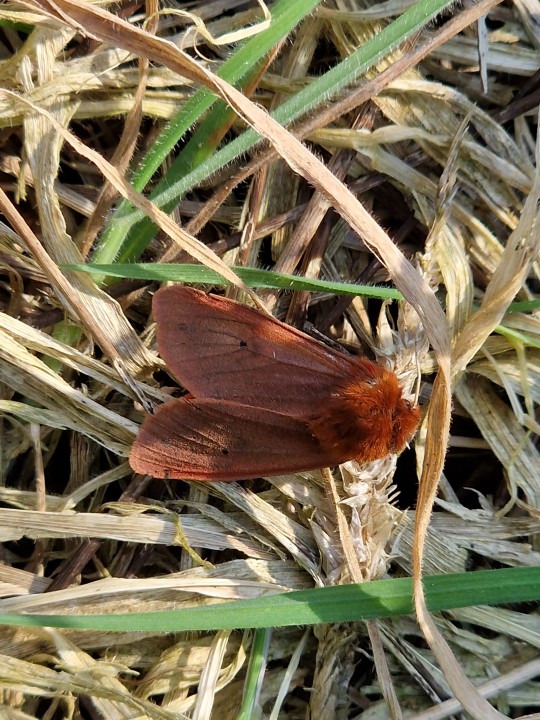
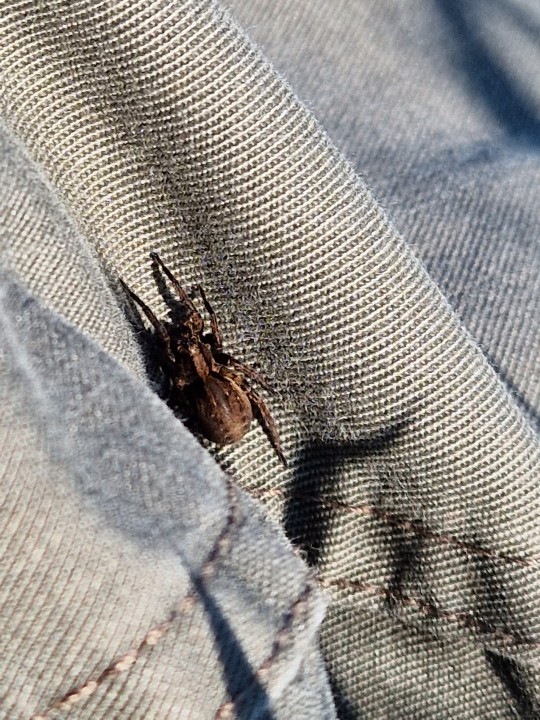
A few friends I made the other day
0 notes
Text

Ensign Fly
A tiny ensign fly on the tip of an Endres cranesbill flower petal.
#canon#canonuk#ensign fly#fauna#flies#fly#garden#insect#insects#invertebrate#invertebrates#lesser dung fly#minibeast#minibeasts#nature#outdoors#sepsis#wildlife
3 notes
·
View notes
Text
This may be the last time

View On WordPress
0 notes
Text
my favorite insect fact ever is that nocturnal dung beetles can actually see the milky way and even use it in order to navigate! i think thats so crazy to think about!!
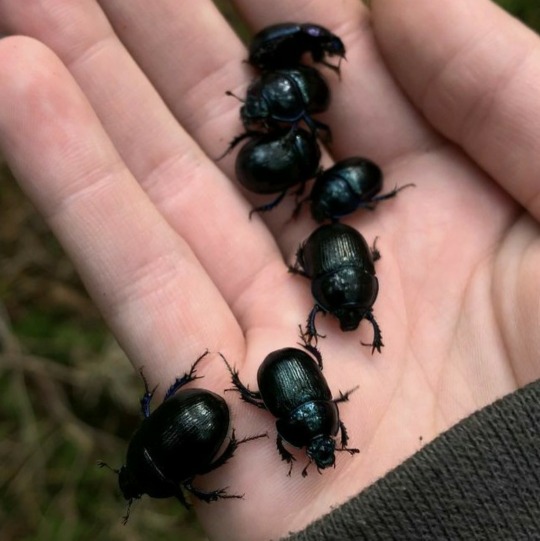


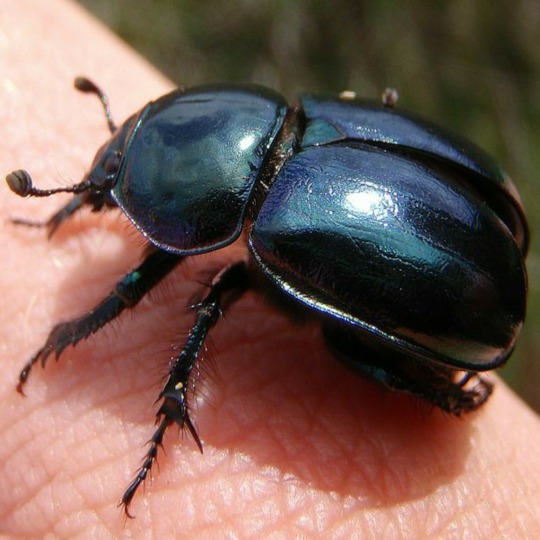
dung beetles are my favorite beetles ever, but i dont really share that because people think theyre gross. i hope this allows other people to see how cool they actually are! i also love seeing them fly theyre so sick and rad.
3K notes
·
View notes
Text

Important question. When Appa has to take a shit does he just like let it rip at 3,000 feet or do they have to land for that
#I think we are indeed talking cow dung here#like diet wise a flying bison and a cow should be similiar right?#of course the digestive systems could work differently and thus the consistency of the stool would differ#but assuming that the shit of a flying bison and a regular cow are indeed similiar#then depending on the height and speed of appa#the velocity of the shit and air resistance should splatter the feces into tiny pieces#therefore appa taking a shit mid-air should not harm anyone underneath
3K notes
·
View notes
Text
I see at least one cool bug a day, and usually many more, but it’s not because I live anywhere particularly rich in strange, wonderful creatures (I live in an unremarkable corner of Pennsylvania, USA) or spend all of my free time looking for bugs (well, just *most* of it). in my experience, finding interesting bugs is less about actually locating them and more about looking closely at tiny things you’d otherwise ignore!
this very long post was compiled over a couple days in late July, although I spent less than 10 minutes at a time searching. there’s a lot of fun creatures just out in the open.
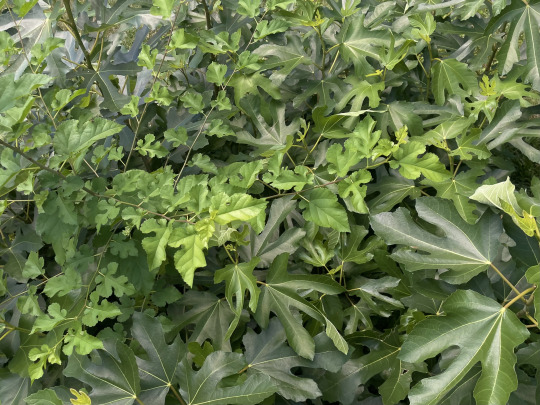
plants are always a good place to start when looking for bugs, and I chose this small fig tree (Ficus carica) with a mulberry sapling friend. feeding on the sap of the fig and mulberry is the first group I’ll take a look at, the planthoppers:
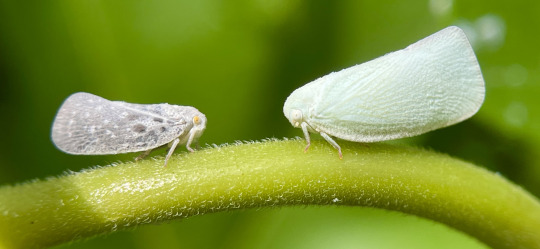
these two are flatid bugs, Metcalfa pruinosa and Flatormenis proxima. flatids are slow-moving bugs that can be approached closely, but once they get tired of circling around stems to avoid you they may launch themselves into a fluttering flight with spring-loaded rear legs.
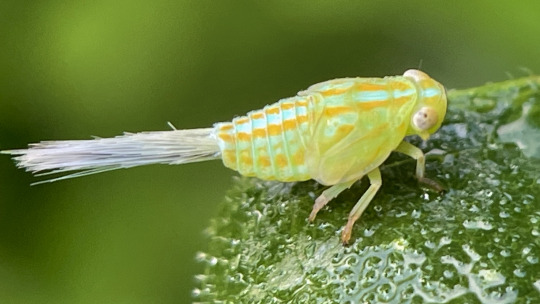
Aplos simplex, a member of the related family Issidae, also likes fig sap. its “tail” is actually a tuft of waxy secretions, which get shed along with the bright colors when it assumes a lumpy, bean-shaped adult form.
cicadellids, or leafhoppers, are just about everywhere on plants, but can be hard to approach without scaring them.
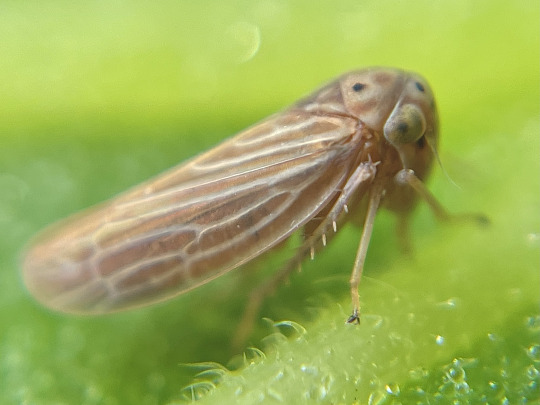
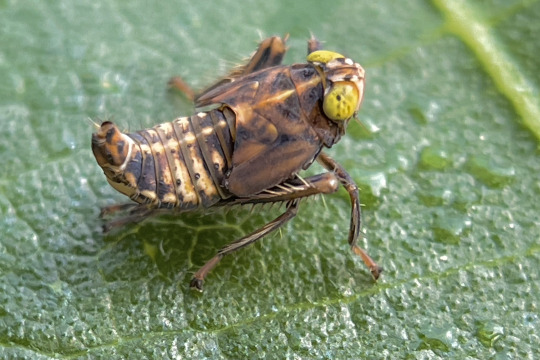
Agallia constricta on the left is a tiny species that feeds on grass, but many were scared up onto the fig by my footsteps. Jikradia olitoria is a much larger species that does feed on the fig; juveniles like this are curled, creeping goblins while adults’ rounded wings give them a pill-shaped appearance.

this big, pale leafhopper belongs to genus Gyponana. it’s tricky to get to species ID with these.
Graphocephala are striking little hoppers that eat a variety of native and nonnative plants. G. coccinea is the larger, more boldly colored one and G. versuta is smaller but more common locally. they’ll sit on the tops of leaves but take flight if you get too close quickly.
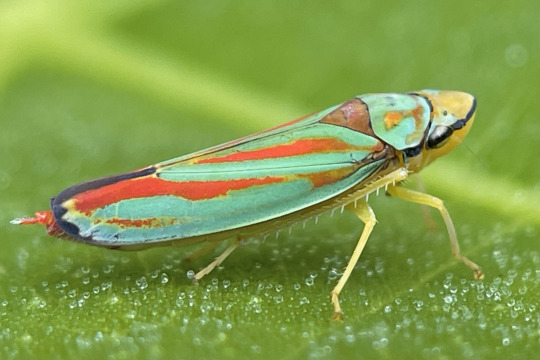
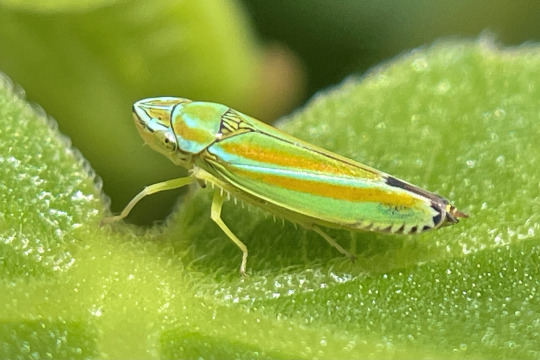
another group you’re almost guaranteed to encounter are flies (Diptera). these are a very diverse group, so much more than houseflies and mosquitoes (though I did run into both)
where I live, any plant with broad leaves is almost guaranteed to have a few Condylostylus, long-legged flies that come in shades of blue, green, and red. despite their dainty physique, they’re agile predators, typically feeding on other small flies.
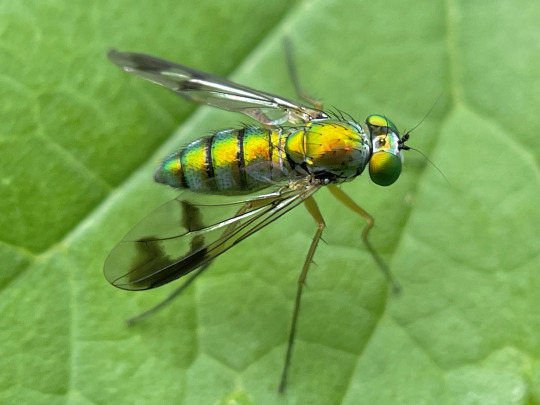
next, a few hoverflies: the ubiquitous Toxomerus geminatus and a Eumerus that I’ve been seeing a lot of this year (but maybe I’ve just noticed them for the first time). syrphids have varied life histories, but most adults drink nectar and many of the larvae are predaceous on aphids.
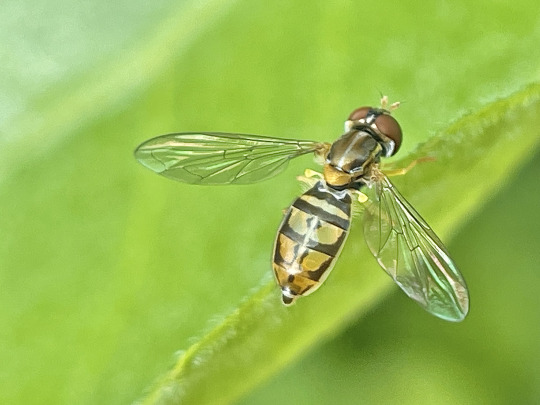
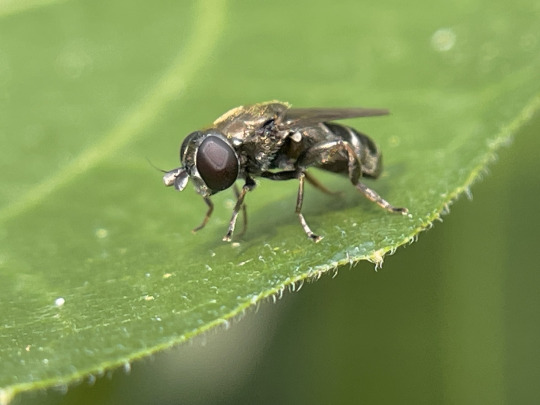
the metallic green soldier fly is Microchrysa flaviventris, nonnative here. Coenosia is a fun example of a “fly that looks like a fly,” with big red eyes and a gray body, and you might think they’re just another dung-sucking pest, but they’re actually aggressive predators! this one seemed to have nabbed itself some sort of nematoceran fly, maybe a fungus gnat.
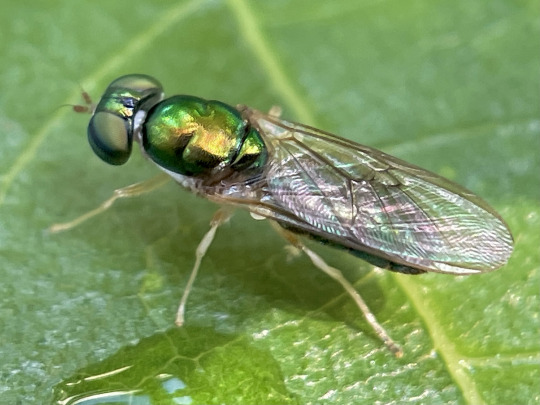
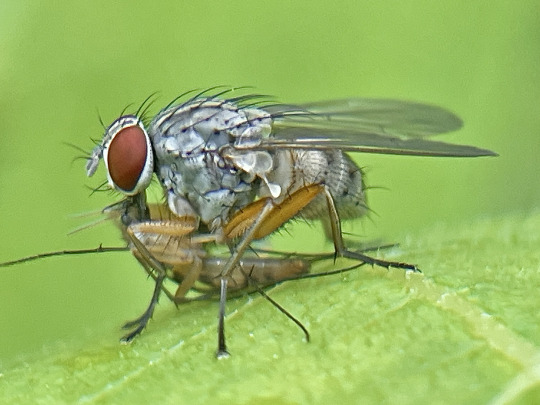
many flies are very tiny, just millimeters long. the first two little fellows are lauxaniids, while the last one, an agromyzid leafminer Cerodontha dorsalis, burrows through grass leaves as a larva.
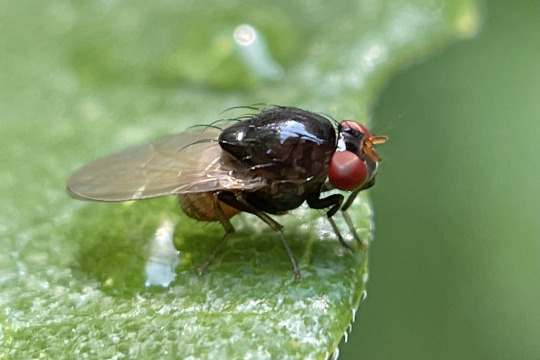
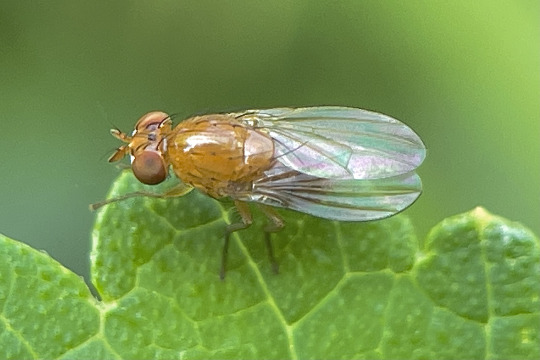
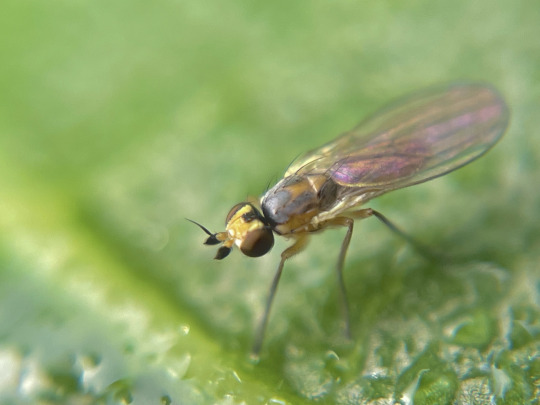
while moths and butterflies (Lepidoptera) are drawn to plants for their flowers or to lay eggs, many small moths can easily be found resting on or under leaves during the day.
these first two are tortricids, many of which are flat, rectangular moths resembling chips of bark or dead leaves. the apple bud moth, Platynota idaeusalis, feeds on a wide variety of hosts, while this beat-up old Argyrotaenia pinatubana would have developed in an edible tube nest of pine needles.
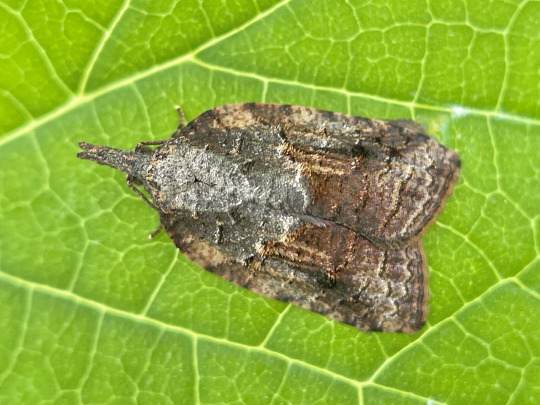
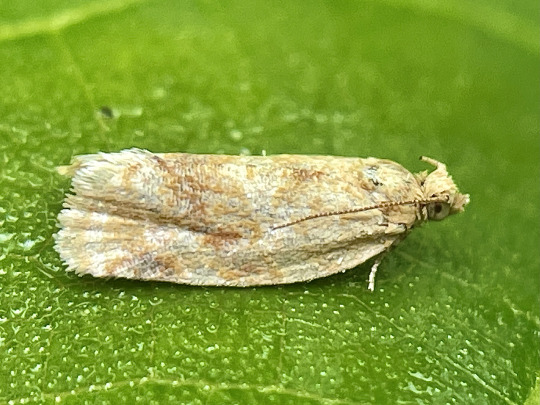
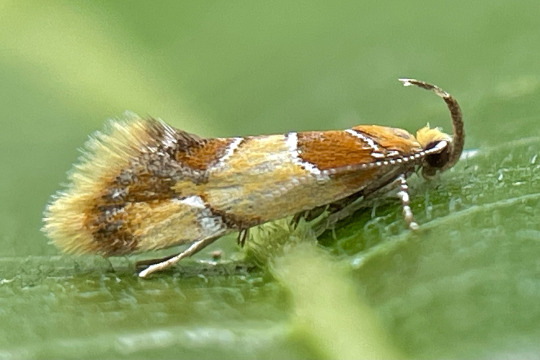
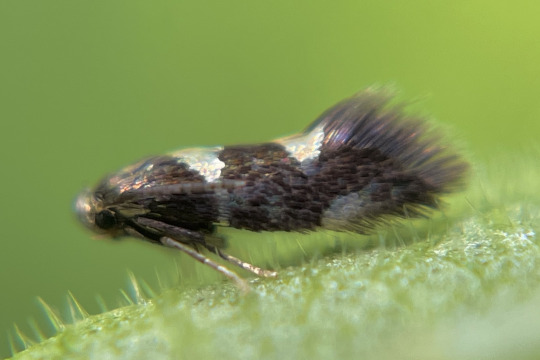
Callima argenticinctella feeds in bark and dead wood (a resource used by more caterpillars than you’d realize!) while the last moth, possibly an Aspilanta, is a leafminer.
although beetles (Coleoptera) are famous for their diversity, I didn’t find too many on the fig. the invasive Oriental beetle Exomala orientalis resting here can be found in a wide range of colors, from this common tan to to deep iridescent black. the other beetle is a Photinus pyralis firefly, sleeping under leaves as fireflies do.
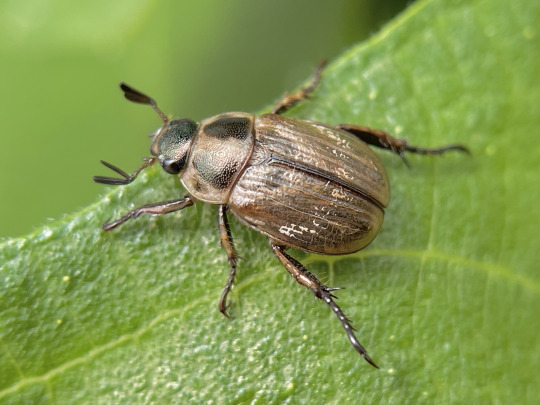
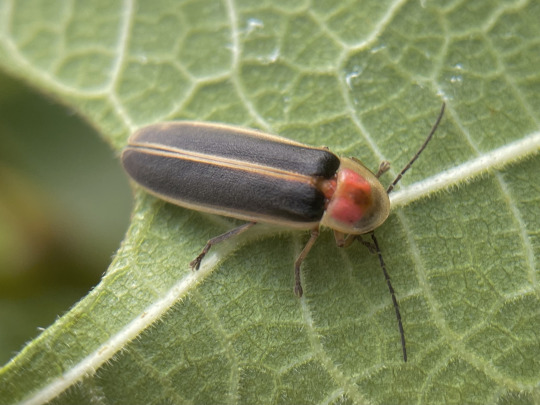
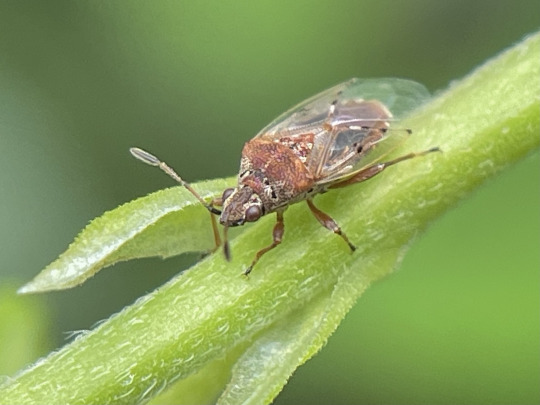
a few spare hemipterans: a Kleidocerys resedae that blew in on a wind, and below, the mulberry whitefly Tetraleurodes mori feeds on its namesake host. as for Hymenoptera, I saw manny tiny parasitic braconid wasps and various ants attracted to the planthoppers’ honeydew excretions—always worth checking underneath roosting hoppers for things having a drink.
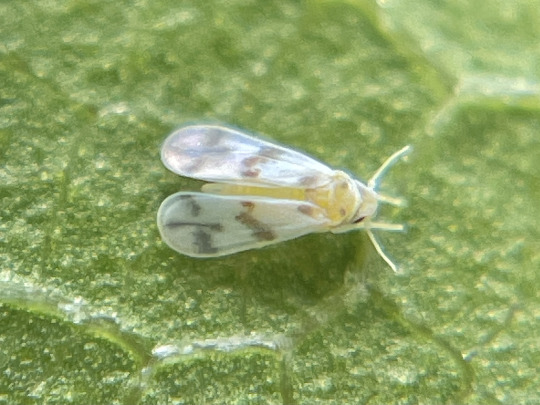
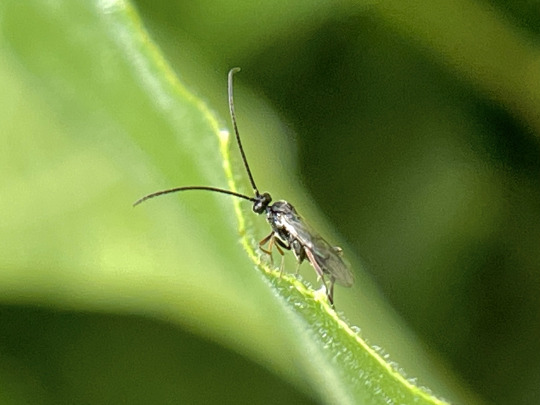
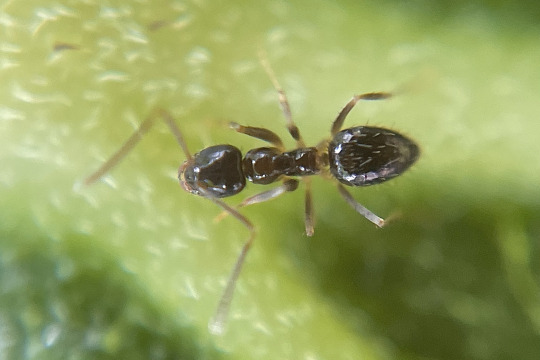
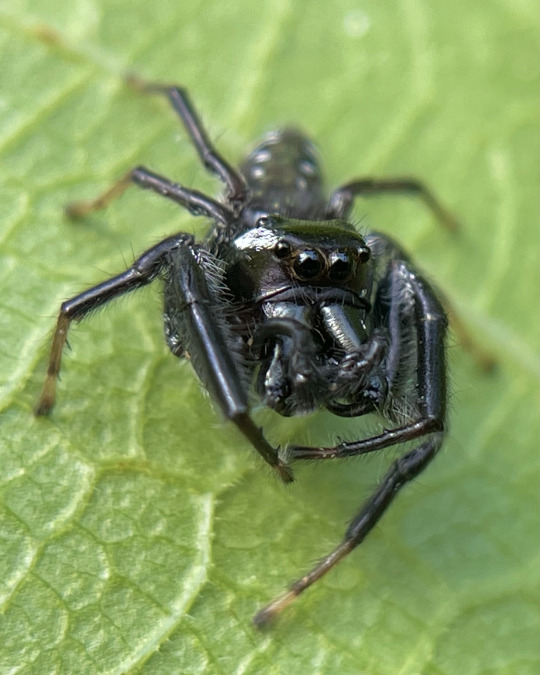
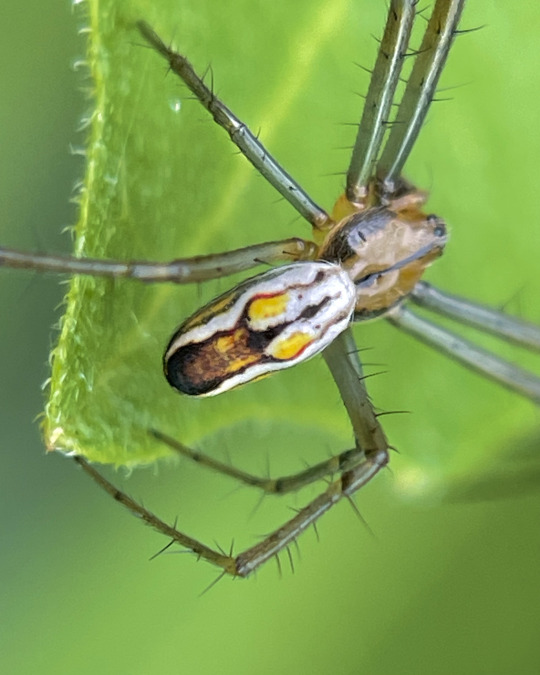
a couple handsome spider boys were scrambling through the fig seeking females, a jumping spider Paraphidippus aurantius and an orbweaver, Mecynogea lemniscata.
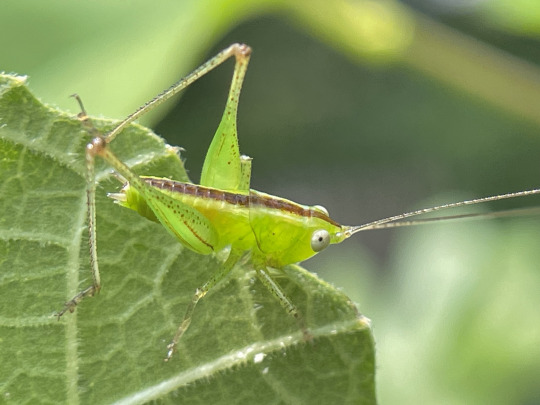
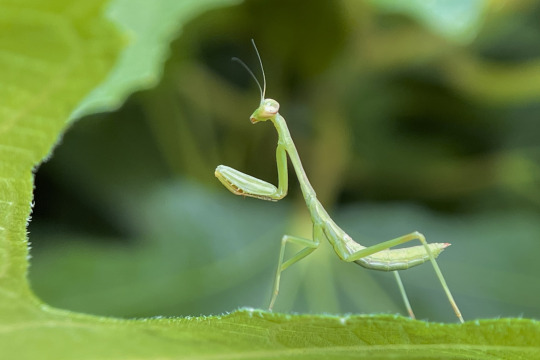
and to round it off, a young Conocephalus meadow katydid and a Carolina mantis, Stagmomantis carolina.
there’s 31 species of arthropod in this post, and I probably saw some 45, not all of which stayed for photos. if you walk slowly and look closely, you can see a sizeable chunk of your local biodiversity in under fifteen minutes! of course this will depend on where you live and what time of year it is, but there’s almost always more cool bugs out there than you’d expect, even on just a single plant.
1K notes
·
View notes
Photo



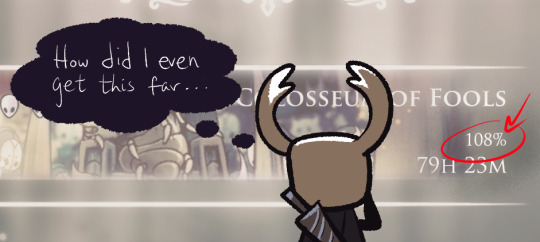
playing hollow knight
transcripts below
[ID: First image: Three drawings of Little Ghost. In the first, they are holding their nail and staring at the viewer with tears in their eyes. The nail and the left side of their face have splatters of the infection. Text reads: “scared.” In the second, they are shaking with tears in their eyes. Text reads: “soooo scared.” In the third, there is a trail of infection leading to them. Both their nail and face have splatters of the infection. Their right hand is comically enlarged, shaking, and is gripping a Hwurmp. Text reads: “WHERE IS CORNIFER.”
Second image: A drawing of Little Ghost, the Weaverlings and Glowing Womb Hatchlings, and Grimm. Little Ghost is surrounded by the dung clouds from the Defender’s Crest. They are lying on the ground with an exhausted look in their eyes while the Weaverlings jump happily around them and the Hatchlings high-five while flying above them. Grimm bows to them with a happy expression. Both Ghost and Grimm have scratch marks on their masks and cloaks, indicating that they have been fighting. Text reads: “I* beat Grimm. *the summons”
Third image: A drawing of the Weaverlings and Glowing Womb Hatchlings arranged in a line in the foreground and the Grimmchild flying next to Ghost in Greenpath. All of them are glaring at the viewer with an angry expression. Ghost is surrounded by the dung clouds from the Defender’s Crest. Text reads: “wyd when my gang pull up?? 😈😈‼️‼️”
Fourth image: A small screenshot of Hollow Knight’s file selection menu. Ghost is drawn staring thoughtfully at the completion percentage which is circled in red and has an arrow pointing to it. Text reads: “How did I even get this far...” /end ID]
5K notes
·
View notes
Text
I wish I was a Lordran girl. I would eat Dung Pies and Purple Moss Clumps. I would let the Gargoyles fly me to Anor Londo every day and Walk into the Abyss every night. I would run through the lava of Lost Izalith and sink in the swamp of Blighttown. I would spend my weekends throwing prism stones in Crystal Cave and even visit the coast of Ash Lake.
I wish I was a Lordran girl :(
880 notes
·
View notes
